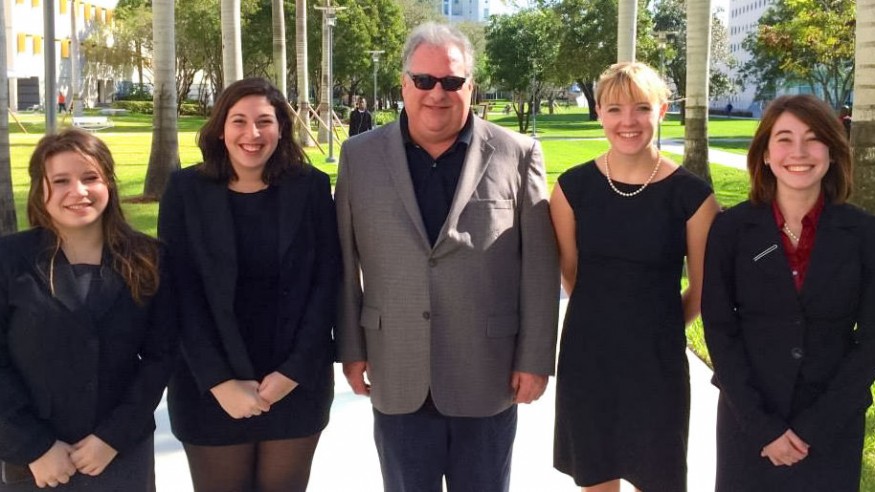
Four Ohio Wesleyan Students Participate in National Moot Court Competition
Two teams of Ohio Wesleyan Moot Court students participated in national competition Jan. 16-17 in Florida. Shown with their coach and OWU politics and government professor Michael Esler are Lidia Mowad (left), Jordan Bernstein, Rhiannon Herbert and Katherine Berger. (Photo courtesy of Michael Esler)
Team of Katherine Berger and Rhiannon Herbert Finishes 17th in U.S.; Berger Earns Honors as 9th Best Orator
DELAWARE, Ohio – Two Ohio Wesleyan University teams competed this month in the American Collegiate Moot Court Association National Championships held at the Florida International University College of Law in Miami.
The two-person teams of juniors Katherine Berger and Rhiannon Herbert and seniors Lidia Mowad and Jordan Bernstein squared off against 160 other students Jan. 16-17 at the national competition.
The Berger/Herbert team finished 17th in the nation, missing the “sweet 16” round by only a handful of points. The team was one of only six that won all six ballots in its qualifying rounds. Although they were upset in the second elimination round, the duo scored high enough to finish as the top team of the 32 teams in the round. Berger is from Sunbury, Ohio, and Herbert is from Mentor, Ohio.
Berger won the award for the ninth best individual orator at the competition, ranking her in the top 6 percent of orators who competed in the nationals and in the top 1 percent nationally.
“Berger is a superstar and our leader,” said coach Michael Esler, Ph.D., professor of politics and government. “This is her third year of excellent performances, but her first trip to the nationals. It is, therefore, impressive that our other three qualifiers were all first-year competitors. They improved steadily throughout our preparation in the summer and fall, and took it to a whole new level when they got before the judges in the tournaments.”
The Mowad/Bernstein team also put in a strong performance, Esler said, and missed qualifying for the elimination rounds by a single ballot. Bernstein is from Charlotte, North Carolina, and Mowad is from Poland, Ohio.
“The Mowad/Bernstein team was just as remarkable,” Esler said. “Both were seniors and prior to this year had not been involved in the pre-law program or taken any pre-law courses. However, they picked up legal analysis and how to present it amazingly fast.”
This is the fourth consecutive year that Ohio Wesleyan has qualified a team for the nationals, Esler said, and the first year in which OWU has sent more than one team. “In this year’s tournament, the Berger/Herbert team finished higher than any other team that OWU has qualified for the nationals,” he said, “and it is the first time an OWU student (Berger) has placed in the top 20 for individual honors.”
Overall, Esler said, OWU Moot Court had its strongest year this season. “We fielded more teams than ever before (nine) and advanced more teams to elimination rounds at the regional tournaments (seven) than ever before,” he said. “Everybody worked hard and pulled their weight. Everyone got along and supported each other in developing and presenting arguments. … They were a great bunch of students.”
The American Collegiate Moot Court Association is the premier undergraduate moot court association in the nation. Each year a moot (fictitious) case is written that raises two constitutional issues. This year’s issues were whether a set of regulations passed by the state of “Olympus” created an “undue burden” on the right to abortion and whether those regulations constituted a violation of the free speech rights of abortion providers.
Teams consist of two students, each of whom prepares and delivers a legal argument for both sides of one of the issues, which is presented to a panel of judges in competition with teams from other colleges. Students base their arguments on a number of actual court decisions that relate to their issue. Students are guaranteed that they will argue both sides of their issues during each tournament.
Learn more at Ohio Wesleyan’s Pre-Law Studies Program at https://owu.dev.fastspot.com/academics/departments-programs/department-of-politics-government/pre-law-major/.
Founded in 1842, Ohio Wesleyan University is one of the nation’s premier liberal arts universities. Located in Delaware, Ohio, the private university offers 86 undergraduate majors and competes in 23 NCAA Division III varsity sports. Ohio Wesleyan combines a challenging, internationally focused curriculum with off-campus learning and leadership opportunities to connect classroom theory with real-world experience. OWU’s 1,750 students represent 46 U.S. states and territories and 43 countries. Ohio Wesleyan is featured in the book “Colleges That Change Lives,” listed on the latest President’s Higher Education Community Service Honor Roll with Distinction, and included in the U.S. News & World Report and Princeton Review “best colleges” lists. Learn more at www.owu.edu.
